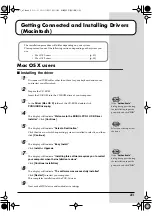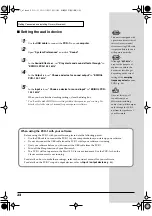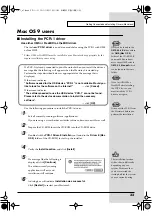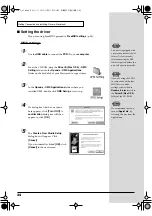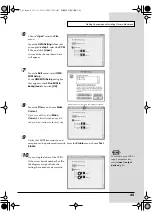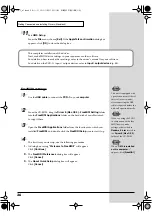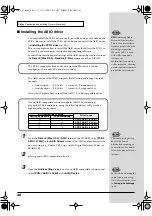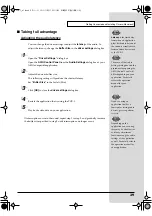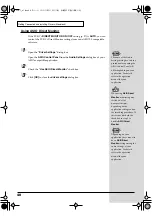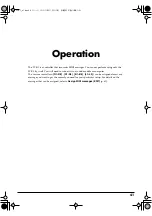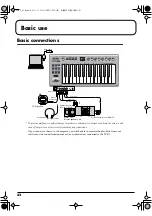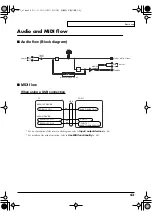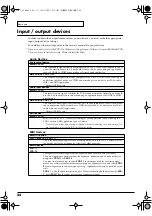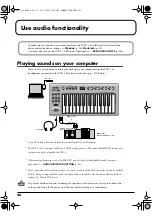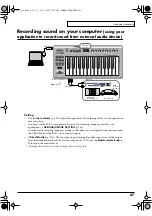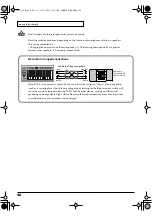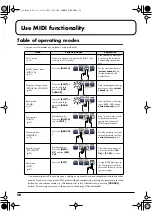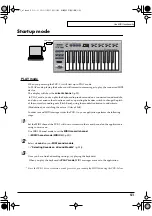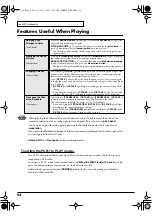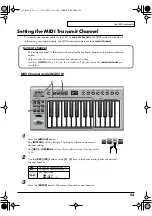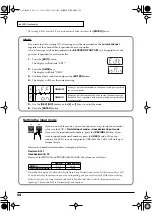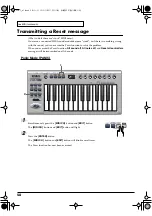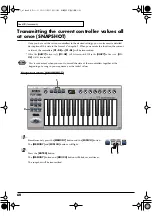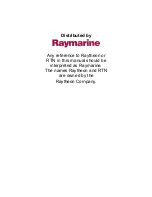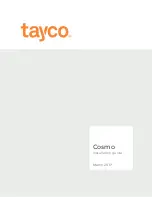
45
Basic use
Two MIDI ports
Some sequencer software that supports MIDI controllers lets you independently specify the MIDI
input port used for recording MIDI tracks (the “MIDI IN port”) and the MIDI input port used to control
the software (the “CTRL IN port”).
fig.midi-port.e
Normally, you will connect your MIDI keyboard to the
MIDI IN port, and use it for recording your
performance on tracks or using the MIDI Thru
function of your software to play sound modules or
soft synthesizers. The MIDI messages sent here have
the meaning that is assigned to them by the MIDI
specification. In other words, when you play the
keyboard, note messages will be transmitted and
recorded on the track, and the sound module that
receives these messages will produce sound.
fig.midi-port2.e
In contrast, the data received from the CTRL IN port is
used to operate your software in the same way as data
from your computer’s mouse or keyboard; it will not
be recorded on the tracks or “thru-ed” to your sound
module or soft synthesizer. The MIDI messages sent
here are interpreted in a completely different way than
defined in the MIDI specification.
For this reason, messages that are input from the CTRL
IN port are not normally “thru-ed” to your sound
module or soft synthesizer.
For example, even if you play your keyboard to send a
note-on message, the software that receives this
message will not produce a note; instead, it might
interpret this message as meaning that the PLAY/
STOP button had been pressed.
The actual operation that will occur will depend on the
software you are using.
fig.midi-port3.e
Since the same MIDI message can be interpreted in
completely different ways, as described above, the
software lets you specify the MIDI IN port and CTRL
IN port separately so that the two types can be
distinguished.
When the PCR-1 is connected via USB, you can select
either of the two MIDI ports (PCR-1 1, PCR-1 2) as the
output destination for MIDI messages produced by the
faders, knobs, and buttons of the PCR-1.
In other words, by assigning “PCR-1 1” as your
software’s MIDI IN port and “PCR-1 2” as its CTRL IN
port, you can do things like using the button
operations to control mixer operations in your
software while using the knobs to edit your software
synthesizer.
The output destination of the MIDI messages transmitted when you operate the PCR-1’s knobs, and
buttons can be specified separately for each controller. (
Sequencer software
MIDI IN port
MIDI OUT port
CTRL IN port
Record on
tracks
Software
synthesizer
Track
Track
THRU
MIDI sound module
PCR-1
Track
Track
THRU
Sequencer software
MIDI IN port
MIDI OUT port
CTRL IN port
Record on tracks
Software
synthesizer
PCR-1
Track
Track
PCR-1 1
PCR-1 2
THRU
MIDI IN port
MIDI OUT port
CTRL IN port
Record on tracks
Software
synthesizer
MIDI sound module
Sequencer software
PCR-1_e1.book 45 ページ 2003年11月20日 木曜日 午後3時22分
Содержание Edirol PCR-1
Страница 98: ...98 MEMO PCR 1_e1 book 98...

